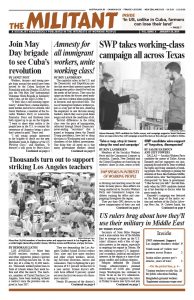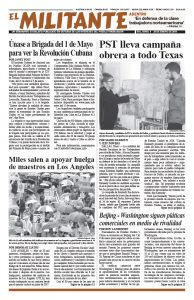The excerpt below is from Women’s Liberation and the African Freedom Struggle by Thomas Sankara, one of Pathfinder’s Books of the Month for January. Sankara led an uprising in 1983 to establish a popular revolutionary government in Burkina Faso, in West Africa. He had been won to communism and was inspired by the Cuban Revolution. Workers, peasants and youth were mobilized to carry out deep-going social measures in one of the poorest countries in the world, as well as to extend international solidarity. In 1987, Sankara was assassinated in a counterrevolutionary coup. Copyright © 1990 by Pathfinder Press. Reprinted by permission.
BY THOMAS SANKARA
We undoubtedly owe a debt to dialectical materialism for having shed the greatest light on the problem of the conditions women face, allowing us to understand the exploitation of women as part of a general system of exploitation. Dialectical materialism defines human society not as a natural, unchanging fact, but as the exact opposite.
Humankind does not submit passively to the power of nature. It takes control over this power. This process is not an internal or subjective one. It takes place objectively in practice, once women cease to be viewed as mere sexual beings, once we look beyond their biological functions and become conscious of their weight as an active social force. What’s more, woman’s consciousness of herself is not only a product of her sexuality. It reflects her position as determined by the economic structure of society, which in turn expresses the level reached by humankind in technological development and the relations between classes.
The importance of dialectical materialism lies in going beyond the inherent limits of biology, rejecting simplistic theories about our being slaves to the nature of our species, and, instead, placing facts in their social and economic context.
From the beginning of human history, man’s mastering of nature has never been accomplished with his bare hands alone. The hand with the opposable thumb is extended by the tool, which increases the hand’s power. It was thus not physical attributes alone — musculature or the capacity to give birth, for example — that determined the unequal status of men and women. Nor was it technological progress as such that institutionalized this inequality. In certain cases, in certain parts of the globe, women were able to eliminate the physical difference that separated them from men.
It was the transition from one form of society to another that served to institutionalize women’s inequality. This inequality was produced by our own minds and intelligence in order to develop a concrete form of domination and exploitation. The social functions and roles to which women have been relegated ever since are a living reflection of this fact. Today, her childbearing functions and the social obligation to conform to models of elegance determined by men prevent any woman who might want to from developing a so-called male musculature.
For millennia, from the Paleolithic to the Bronze Age, relations between the sexes were, in the opinion of the most skilled paleontologists, positive and complementary in character. So it was for eight millennia. Relations were based on collaboration and interaction, in contrast to the patriarchy, where women’s exclusion is a generalized characteristic of the modern historical era.
Frederick Engels not only traced the evolution of technology but also of the historic enslavement of women, which was born with the arrival of private property, owing to the transition from one mode of production to another, and from one form of social organization to another. …
Humankind first knew slavery with the advent of private property. Man, master of his slaves and of the land, also became the owner of the woman. This was the great historic defeat of the female sex. It came about with the upheaval in the division of labor, a result of new modes of production and a revolution in the means of production.
In this way, paternal right replaced maternal right. Property was now handed down from father to son, rather than as before from the woman to her clan. The patriarchal family made its appearance, founded on the sole and personal property of the father, who had become head of the family. Within this family the woman was oppressed. …
Thus, throughout the ages and throughout different types of society, women suffered a sorry fate, in a continually reinforced position of inferiority to men. Though the inequality was expressed in many and varied ways, it continued to exist nevertheless.
In slave society, the male slave was looked upon as an animal, a means of production of goods and services. The woman, whatever her social rank, was crushed within her own class and outside of that class. This was the case even for women who belonged to the exploiting classes. In feudal society, women were kept in a state of absolute dependence on men, justified by their supposed physical and psychological weakness. Often seen as a defiled object and a primary agent of indiscretion, women, with a few rare exceptions, were kept out of places of worship. In capitalist society, the woman, already morally and socially persecuted, is also subjugated economically. Kept by the man if she does not work, she remains under a man’s domination even when she works herself to death. We will never be able to paint an adequate picture of the misery women suffer, nor show too strongly that women share the misery of proletarians as a whole. …
Comrades, the future demands that women be liberated, and the future, everywhere, brings revolutions. If we lose the fight to liberate women we will have lost all right to hope for a positive and superior transformation of our society. Our revolution will then no longer have any meaning. It is to wage this noble struggle that all of us, men and women, are summoned.



